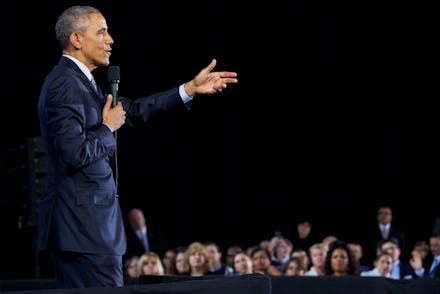Obama Thinks We Should Make Voting Mandatory. Here's What Would Happen if We Did.

During the Q&A portion of an event in Cleveland, Ohio, on Tuesday, President Barack Obama fielded a question about the role that unlimited campaign spending plays in corrupting politics.
He began his reply with a discussion of the corrosive effect that money has on various elements of the political process, and declared that doing away with laws that allow campaigns and the government to be flooded with cash was an essential long-term goal for the strength of American democracy.
Obama then went on to float an idea that he considered more realistic in the short-term, and it wasn't exactly what anyone was expecting: mandatory voting.
Pointing to the example of Australia, Obama sang the praises of compulsory voting as a practice that would be "transformative" and "counteract money more than anything." He continued:
If everybody voted, then it would completely change the political map in this country, because the people who tend not to vote are young; they're lower income; they're skewed more heavily towards immigrant groups and minority groups; and they're often the folks who are — they're scratching and climbing to get into the middle class. And they're working hard, and there's a reason why some folks try to keep them away from the polls. We should want to get them into the polls.
At first blush, the eccentricity of his suggestion is depressing. The fact that the president considers mandatory voting more politically feasible than campaign finance reform is remarkable. It speaks volumes about the enormity of the legal obstacles to overturning the Supreme Court's 2010 Citizens United decision, which jettisoned limits on how much corporations, unions and individuals can contribute to independent efforts to sway elections.
But it also raises the question: What would mandatory voting mean for the U.S.?
The Australian example: Australia made voting compulsory on the federal level in 1924 in order to boost voter turnout and moderate campaign spending. Every citizen is expected to show up at the polls or face a small fine, equivalent to about $15.
By the measure of voter turnout, there's strong evidence that it has worked. From 1919 to 1922, voter participation dropped from 71% to 60%. But just one year after the new law was introduced, citizens came out to the polls in droves — in 1925, voter turnout was over 91%, according to the Australian Election Commission.
It wasn't just beginner's luck. Since then, Australian voter turnout has never dipped below 90%. In the nine Australian House of Representatives elections prior to compulsory voting, participation averaged 64.2%.
To provide some perspective, only 36% of eligible voters in the U.S. participated in the 2014 midterm elections. Voter turnout was about 59% in 2012, according to the United States Election Project.
Australia also enjoys a strikingly full-bodied representation of its electorate's more marginalized citizens. Voting takes time and information, and people who don't have the luxury of either are less likely to cast a ballot than those who do. Compulsory voting helps to remedy this. In the U.S., people of color, the poor and younger people are significantly less likely to vote — or overcome policies deliberately designed to make doing so harder for them. But if everyone has to vote, those dynamics don't matter as much.
Vox's Dylan Matthews points out a thorough multi-country survey of compulsory voting by Stanford University's Simon Jackman, who laid out the way in which it acts as a socioeconomic equalizer:
"Comparative studies of turnout note that the relationship between socioeconomic status and voter turnout weakens as turnout increases," Jackman writes. "Thus, to the extent CV [compulsory voting] increases turnout, CV also removes socioeconomic differences in electoral participation. Quite simply, when everyone votes, there can be no socioeconomic 'biases' in turnout."
Not a cure-all: Compulsory voting has its issues. While it consistently commands the support of a significant majority of Australians, the system is not without critics. Some argue that it infringes on a citizen's right to not vote or endorse a party system they consider unworthy of participation. There are also questions around what it means to compel politically apathetic people to make political choices, and how to deal with the uniquely toxic strand of political culture that can emerge when turnout is taken for granted, and politicians can just snipe at each other rather than work on a platform that inspires.
Just as importantly, the influence of money in politics wouldn't disappear if voting were mandatory. While politicians would face more pressure to address the needs of marginalized citizens, they would also continue to rely on moneyed donors to fund their campaigns. Those donors — the ones who have the most influence today — would still hold special sway.